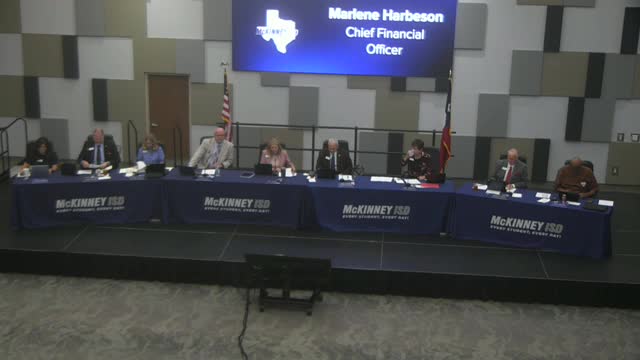McKinney ISD receives 'Superior' School FIRST rating; board accepts draft audit and adopts certified tax roll
Get AI-powered insights, summaries, and transcripts
Subscribe
Summary
McKinney ISD reported a 'Superior Achievement' School FIRST financial rating from TEA, accepted a draft fiscal-year audit, and adopted the certified 2025 tax roll. Auditors described an unmodified (clean) opinion as likely once pending federal guidance is finalized.
The McKinney Independent School District reported a "Superior Achievement" rating under the Texas Education Agency’s School FIRST financial integrity system and the Board of Trustees accepted a draft of the fiscal 2024–25 audit and adopted the district’s certified 2025 tax roll Monday night.
Chief Financial and audit presenters told the board that McKinney ISD scored 96 out of 100 on School FIRST — the TEA accountability tool that reviews fiscal practices using multiple indicators — and that the district satisfied nearly all compliance measures in the 23–24 fiscal-data review. The presentation covered indicators including timely filing of the annual financial report, compliance with debt agreements, cash-on-hand, fund-balance measures, and administrative-cost ratios.
Assistant auditors from Eide Bailly LLP said they planned to issue an unmodified (clean) opinion on the district’s financial statements for the year ended June 30, 2025, contingent on final federal single-audit guidance. Kevin Randolph of Eide Bailly described the draft audit as materiality-consistent with generally accepted accounting principles and noted the firm found no instances of noncompliance or material weaknesses in internal controls for major federal programs tested (the major program sampled was the special education cluster).
Randolph reviewed key balance-sheet numbers: total assets of about $963.1 million and liabilities of about $700.9 million, including $449.5 million of bonds payable and an allocated TRS pension/OPEB liability of approximately $122 million (an actuarial allocation used for statewide pension accounting). General fund revenues rose from about $388.7 million to $403.8 million year over year, driven largely by local revenue increases, while expenditures grew by about 6% to roughly $471.5 million, reflecting instruction, debt service, and capital spending related to construction projects.
District staff and auditors noted that certain external steps remained before the audit is final: federal compliance guidance from OMB/OMB’s compliance supplement and a new TEA audit application system. Because federal guidance was not finalized, the board approved the audit draft subject to final federal guidance and an eventual final approval when the auditors complete the single-audit work.
Following the audit presentation, the board voted to accept the draft audit as presented (motion carried by voice vote). Later in the meeting trustees also approved the district’s certified tax roll for 2025, which staff said reflected a taxable value of $30,197,805,359 and a tax levy totaling approximately $319,955,906; staff noted the numbers assumed the homestead exemption measure that would be on the upcoming November ballot.
Board members asked auditors and staff questions about fund balance and the effect of changes to property tax exemptions and recapture. Auditors and board members discussed that while local tax revenue increased, the state’s recapture and the amount returned from the state could offset those gains. The board’s consent vote to accept the draft audit and its subsequent adoption of the certified tax roll were recorded by voice; the transcript shows motions, a second, and a unanimous verbal “Aye” with no roll-call tally printed in the minutes.
The district’s financial presentation and the audit will be revisited once final federal compliance guidance is released and the auditors complete the single-audit procedures; staff said they would return to the board for formal final audit approval at that time.
